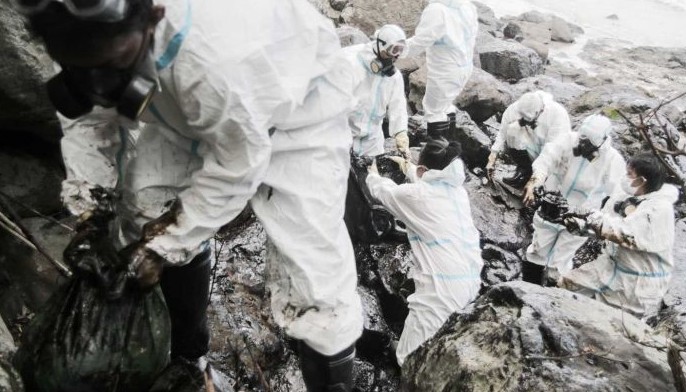MANILA, Philippines — The companies responsible for the oil spill off Oriental Mindoro should be held fully accountable, and provide immediate assistance and compensation to communities whose ways of life have been severely disrupted by the incident, environment groups said.
The Senate committee on environment, natural resources, and climate change on Tuesday held an inquiry into the oil spill that has so far affected 108,000 people in Oriental Mindoro and Palawan.
Related Stories
It was revealed during the hearing that the sunken MT Princess Empress should have never been allowed to sail in the first place as it did not have a permit to operate. The tanker encountered engine failure and sank in rough seas on February 28.
The four-hour hearing also tackled the response of different government agencies, the projections of experts, and the need to provide immediate assistance to affected residents. But the committee did not address the responsibility of the company that chartered the vessel owner, RDC Reield Marine Services, to ship 800,000 liters of industrial oil.
A Rappler report identified SL Harbor Bulk Terminal Corporation, a subsidiary of San Miguel Shipping and Lighterage Corporation, as the charterer.
Center for Energy, Ecology, and Development executive director Gerry Arances said that SMC, as the charterer, is considered as the spiller and owner of the vessel involved.
“A look at rules governing oil spills in our country shows that SMC must pay a cash bond of at least P70 million — P50 million for clean-up and containment and P20 million for damages and payment to impacted communities,” said Arances, who is also a co-convenor of Protect Verde Island Passage.
In its position paper, Greenpeace Philippines questioned the lack of transparency and accountability on the part of the companies involved and even government agencies.
“Greenpeace notes with grave concern how the companies involved in this major catastrophe have not come out with urgency to take responsibility for the spill and its impacts,” the position paper read.
“We must remember that unless the companies involved are held fully accountable, it is the government that will shoulder the costs for ‘clean-up,’ rehabilitation and long-term rehabilitation of the ecosystems and communities impacted, in effect cleaning up and paying for the pollution private companies have caused,” it added.
Petron Corporation, San Miguel’s fuel and oil firm, said in a statement on March 3 that the sunken MT Princess Empress “was not carrying products from the Petron Bataan Refinery nor does Petron own the fuel oil cargo the tanker was carrying at the time of the incident.” The company, however, said it is extending help in containing the spill.
SMC has yet to respond to Philstar.com’s request for comment.
Assistance to impacted communities
The oil spill is severely disrupting the livelihoods of residents, especially fishers — 13,588 of whom have been affected, according to the Office of Civil Defense — who have been ordered to put their activities on hold.
Local government officials present during the hearing said the tank owner was not able to provide assistance to the impacted communities.
“Compensation for damages is one thing… We caused the problem, it is incumbent on us as human beings to extend whatever assistance we can on our volition without anybody asking us to give it. Food is a basic need. We don’t have to ask you to give food,” Oriental Mindoro Governor Humerlito Dolor told RDC Reield Marine Services.
RDC vice president Fritzie Tee noted the firm is currently focused on oil spill response, but said it can help the affected residents.
Plugging the leak
Authorities have yet to recover the vessel and contain the spill to prevent further environmental damage and harm to people.
Environment Secretary Maria Antonia Yulo-Loyzaga said in the hearing that the sunken vessel has been releasing 35,000 to 50,000 liters of oil per day.
“It would take 15 to 20 days to actually empty the vessel if the assumptions are correct,” Loyzaga said.
The University of the Philippines-Marine Science Institute projected that some of the leaked oil may threaten the Verde Island Passage, which is considered the global center of marine biodiversity.
“It is critical that the seepage from the leak is contained before the northeast monsoon or amihan stops; otherwise, other areas may be affected,” said Professor Cesar Villanoy from the UP-MSI.
The DENR also reported that the oil spill affected around 10 hectares of mangrove area in Pola town, and the oil and grease in most of the assessed areas exceeded water quality guideline values.
In its position paper, Oceana Philippines called on the government to declare a state of national calamity, which will enable the mobilization of resources and aid needed to address the environmental and economic impacts of the oil spill. Several local governments have declared a state of calamity in their areas.
“If not contained, the ecological and socio-economic damages that this disaster will bring to our fisheries, marine and coastal resources, human health, tourism, and economy will be tremendous,” it said.


